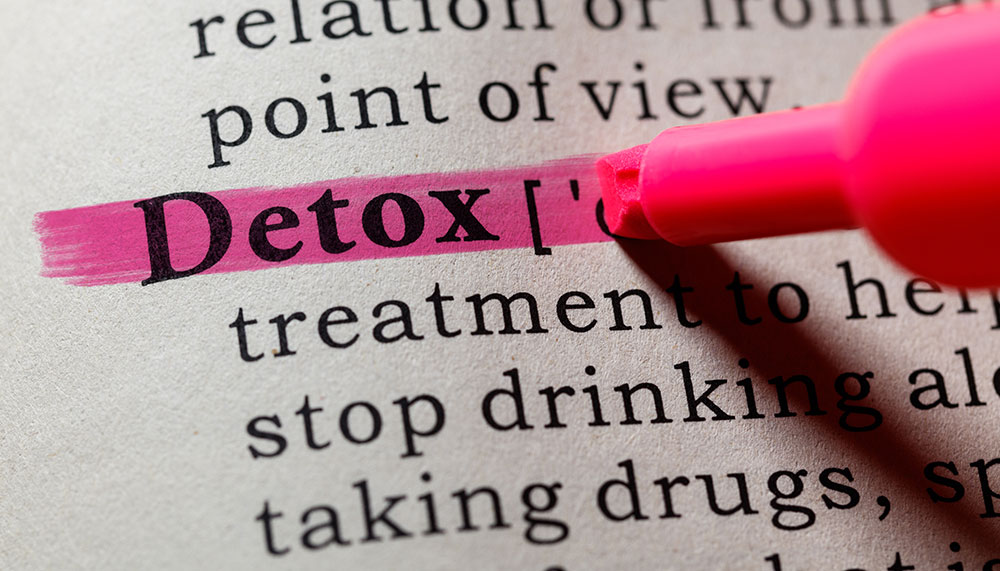Detox & Withdrawal Symptoms
Detoxification is the first step to overcoming drug dependence or alcohol dependence but there are many misconceptions surrounding what detox is and why it is an important part of recovery. If you are unsure of what detox and withdrawal from a substance addiction entails, the following guide explores what to expect during detox, managing withdrawal and the role of therapy in sobriety.
What is a detox?
Detox involves the removal of harmful substances from the body. It is the first line of treatment in overcoming addiction. For alcohol and drug addiction, it is a period within which toxins are metabolized by the body, and active psychological and physiological influences removed.
As the body begins to adjust to the absence of these substances (after prolonged drug or alcohol dependence), the process of withdrawal occurs thereafter. Withdrawal is the set of physical and psychological symptoms that develop when the substance is no longer in the body. Acute symptoms occur 6 to 24 hours after last using the substance (WebMD, 2020).

Medical detox vs. home detox
A medical detox involves the safe removal of toxins from the body in conjunction with medication to ease the symptoms of withdrawal. It is typically used in a private rehab setting with the aid of experienced healthcare professionals. Medical detox is considered safer for recovery from substances such as alcohol and benzodiazepines owing to the risk of substance cessation. Opiate detox carries less risk compared to alcohol and benzodiazepine addictions; however, withdrawal is extremely difficult which increases the chances of relapse. In a rehab setting, doctors will use supportive medication to reduce cravings and painful withdrawal symptoms.
Many are apprehensive about the process of detox for fear of the discomfort caused by withdrawal. During a home detox where medical care and drug support are lacking, severe symptoms such as headaches, migraines, and nausea can compromise the success of detox. Whether you are dependent on alcohol or drugs, a home detox can be a painful process with potential medical complications. As soon as you stop consuming or using the substance, your body will experience withdrawal.
Detoxing at home may feel safer and more comfortable but there is risk of relapsing and the need for medical intervention should symptoms become life threatening. Depending on the severity of dependence and the type of substance involved, a home detox may be facilitated under the strict guidance of an experienced GP. The role of your GP is to help taper your substance use and manage associated health risks. For alcohol, opiate, and benzodiazepine addiction, a medical doctor may provide detox medication along with a referral for therapy through an NHS service.
Owing to the risk of relapse during an in-home detox, the symptoms of withdrawal, and the need for medical supervision, it is important to rely on an experienced medical practitioner who can safely facilitate your detox.
When is a Medical Detox Necessary?
Chronic alcohol or drug dependence that is creating a severe and disruptive impact in personal and professional areas of your life is best managed within a detox centre. If alcohol and drugs such as benzodiazepines are suddenly stopped, it can cause hallucinations, seizures, and cardiac arrest (The Recovery Village, 2020). To facilitate recovery and reduce severe withdrawals, supportive medication is used in conjunction with tapering methods. According to Drug rehab.com (2020), alcohol addiction causes the brain to overcompensate for its depressive effects.
When alcohol is removed, the brain maintains a state of over-activity, but the alcohol is no longer present to create a balance between depressive symptoms and hyperactivity. This increases risk of seizures, tremors, and delirium. The assistance of a medical doctor, supportive detox drugs, along with tapering techniques provide the brain enough time to cope and adjust, which can prevent life threatening circumstances (DrugRehab.com, 2020).
Detoxing from alcohol
Drinking alcohol socially and in moderation is not considered dependence. The question is how does an alcohol addiction start and when does it become a risk? By identifying the warning signs, you or someone you love, can seek the intervention needed for recovery.
Alcohol addiction or alcoholism is defined as an inability to manage drinking habits owing to a physical and psychological dependence (Mayo Clinic, 2018). Dependence can be caused by the interplay of social, environmental, and even genetic factors.
Drinking alcohol is considered problematic when you rely on the substance to cope or to conceal negative emotions. The more you drink, the more your body builds a natural tolerance. This increases the need to drink larger amounts of alcohol to achieve the same feeling.
The more chronic your drinking habits, the higher the alcohol levels in your system, the greater the withdrawal if you stop. The process of alcohol withdrawal can be difficult to manage, which is why a medical professional should always be consulted. In some cases, detox medication may be prescribed to reduce withdrawal symptoms. According to Alcohol.org, common medications used in a supervised detox from alcohol addiction include:
FDA-Approved Medication for Alcohol Withdrawal:
- Valium (Diazepam)
- Librium (Chlordiazepoxide)
- Tranxene (Clorazepate)
- Trileptal (Oxcarbazepine)
- Tegretol (Carbamazepine)

Detoxing from drugs
A drug addiction can involve recreational drugs or prescription medication. These substances become a source of dependence with gradual use and increases in dosage.
Curiosity, social activities, and peer pressure are common reasons individuals experiment with psychoactive substances such as marijuana, heroin, or cocaine. Its gradual use leads to tolerance, which means larger doses to achieve the desired effect.
For others, prescription pills for chronic pain can lead to dependency as tolerance causes prolonged use often in higher doses.
These occurrences combined with addictive tendencies, environmental, and social aspects, can create the recipe for drug dependence.
Overcoming a single drug addiction is hard, but if polydrug use is present, complications during a drug detox can occur. For instance, those who are taking a combination of prescription drugs and drinking alcohol are at risk of suffering a combination of physiological and psychological effects of each substance. To best manage adverse reactions and provide a more comfortable recovery, the detox process for multiple substance use is best managed in a private treatment facility.
Drugs such as benzodiazepines are difficult to withdraw from. In such cases, specialized detox medication may be prescribed to ease withdrawals. Along with tapering methods, alternative benzodiazepines are recommended in the process of drug detox and withdrawal symptom management.
Detoxing from other addictive behaviours
Addictive behaviours do not only pertain to drugs and alcohol. The prevalence of addictions to gambling, video games, technology, and social media are on the rise. When such activities become disruptive to everyday life, interfere with relationships, and create imbalance, it may be helpful to seek a detox plan.
While many try to detox from such addictions at home, the chance of relapsing is high owing to accessibility, a lack of professional supervision and absence of therapy. Behavioural withdrawal symptoms can be similar to the compulsions of a substance disorder and include irritability, preoccupation, decreased social interest, mood instability, shakiness, and poor sleeping patterns (NCBI, 2012).
A private rehabilitation facility developed to address these types of addictive behaviours can help you find balance and manage withdrawals.
Withdrawal symptoms
Withdrawal symptoms are characterised by the physical and the psychological symptoms that develop after reducing or stopping the use of a substance. This can include headaches, dizziness, insomnia, fatigue, nausea, vomiting, hallucinations, and seizures.
Alcohol withdrawal symptoms can start anywhere between 2 hours to 4 days after alcohol intake is stopped (Mayo Clinic, 2020). Symptoms include:
- Shakiness or tremors
- Behavioural issues including agitation and aggression
- Nausea, dizziness, and vomiting
- Rapid heart rate
- Disorientation
- Seizures.
The drug withdrawal process can vary by drug class and consist of the following generic symptoms.
- Mood instability such as depression
- Muscle aches
- Anxiety, hallucinations, and delirium
- Nausea and vomiting
- Seizures.
Individuals will experience variations in their symptoms depending on their physiology and the length of dependency. The faster substances are metabolized, the more frequently it is used to maintain its effects. Chronic users may be impacted by all or only some of these withdrawal symptoms.

How long do withdrawal symptoms last?
In alcohol and drug addiction, the post-acute withdrawal symptoms (PAWS) can last 1-2 weeks. Depending on the drug of choice, these symptoms will differ in severity. The psychological withdrawal symptoms of mood instability, insomnia, and anxiety can last for months, even up to a year. This occurs when large amounts of a substance have been used for an exceptionally long period.
PAWS places the individual at a high risk of relapse. The symptoms occur cyclically and range in intensity. For individuals who have been using alcohol or drugs to manage mental health problems, quitting their substance use can make these problems worse or cause it to re-appear (American Addiction Centers, 2020).
For alcohol users, PAWS involves delirium tremens which includes seizures and psychosis. Such symptoms are accompanied by fatigue, cravings, and ill health.
In drug dependence, individuals using benzodiazepines (which also treats anxiety) can suffer panic attacks, cravings, and illness. Marijuana is associated with stress and depression while stopping opiate use can cause poor cognitive function, fatigue, and severe cravings.
The limitations of a detox only treatment
Both alcohol and drug addictions are incredibly hard to overcome, even with the process of detox in a private rehab facility. The reasons behind the addiction can play a role in maintaining addictive behaviours. Substances used as coping mechanisms, tolerance of prescribed medication, and genetic factors must be addressed for successful intervention.
Detox is only the first step in treatment. To prevent relapse and to determine the underlying cause for addiction, therapy and positive coping strategies must be introduced. Individuals who have successfully overcome addiction can manage a journey of sobriety with outpatient therapies, support groups, and learning how to control both physical and psychological symptoms.

The importance of therapy in preventing relapse
Counselling and therapy are the foundation for recovery. Therapy as an addiction treatment is an important part of relapse prevention. Therapy provides stress management tactics and methods to cope with life’s challenges. Your therapist helps you identify environmental and social triggers that could increase risk of relapse. Counselling also introduces individual support to help you manage cravings.
Therapy a residential rehab or outpatient programme is widely available; however, more individuals are benefiting from therapy in a residential setting. The process of private rehab offers an integrated treatment and a detox programme. Outpatient services, especially those offered free by the NHS and notable charities, continue to help many struggling with addiction. However, free outpatient services have their limitations due to referral lengths and limitations in treatment options.
Professional therapy led by a trained and an experienced therapist can be delivered in a private residential environment, or as an outpatient service. It creates a safe and comfortable atmosphere and makes it easier to apply learned principles in a real-world or everyday setting. The modern programme is designed to assist individuals in overcoming the grip of alcohol and drug addiction with a highly individualized approach.
Private residential rehab focuses on changing behaviours, investigating trauma, and building new relationships in support of sobriety. Private therapy is easily accessible and tailored to meet unique patient needs, which has contributed to its success across addiction treatment plans.
